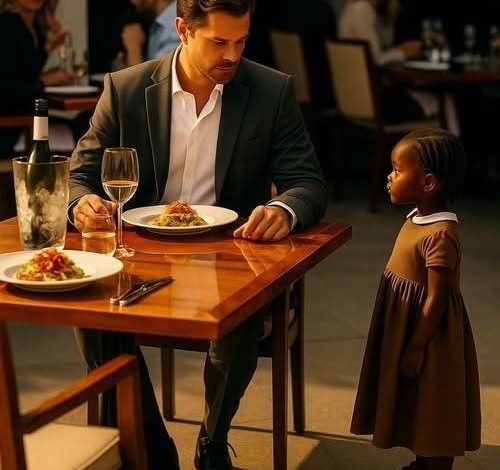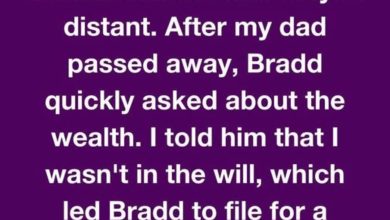Can I Eat with you the Homeless girl asked the millionaire his response leave everyone in tears!

On a crisp October evening, downtown Chicago glittered in the twilight. At Marlowe’s—the city’s riverside Michelin-starred gem—Richard Evans dined alone. A man of stature and silence, he was known in real estate circles for his ruthless deals and ironclad composure. His salt-and-pepper hair was perfectly groomed, his Rolex shimmered beneath the table lamp, and his ribeye—aged to perfection—awaited its first bite.
Whispers followed him into every room. Admiration braided tightly with caution. He had built empires, but few saw past the granite exterior.
Then a voice broke the evening’s still rhythm.
“Sir, may I eat with you?”
Evans looked up. A girl—barefoot, no more than eleven—stood at his table. Tangled hair framed her dirt-smudged face, and her eyes carried a kind of loneliness that needed no translation. The maître d’ moved to intervene, but Evans raised his hand.
“What’s your name?” he asked, folding his napkin with care.
“Emily,” she answered, eyes flicking toward the other diners. “I haven’t eaten since Friday.”
He gestured to the empty seat. The restaurant paused as she climbed up, her feet dangling above the floor. When the waitress arrived, Evans said only, “Bring her my steak. And a glass of warm milk.”
Emily ate slowly, almost reverently, as if worried it might vanish at any moment.
When the plate was clean, Evans leaned in. “Where’s your family?”
Her answer arrived in pieces: a father lost to a fall, a mother long vanished, and a grandmother recently gone. Silence settled over the table. Evans gripped his water glass, the ghosts of his own past pressing close.
Few knew that he had once lived on those same cold sidewalks, collecting cans, sleeping beside radiators in abandoned buildings, learning early that hunger speaks louder than pride. He had clawed his way up, promising himself that if he ever made it out, he’d reach back.
Then he stood and took out his wallet—not for a handout, but for something more.
“Would you like to come home with me?” he asked.
Emily blinked. “What do you mean?”
“I mean a place to sleep. Real meals. A chance to go to school. But it comes with effort and respect. No more going hungry.”
She nodded, tears hovering like glass beads on the rim of belief.
That night, everything changed.
Emily met warmth—hot water, soft linens, the miracle of shampoo and a toothbrush. But survival habits die slow. She slept curled on the floor and hoarded rolls in her sweatshirt. When the housekeeper found her stash of crackers, she broke down. Evans crouched beside her, voice steady: “You’ll never need to be afraid again.”
Under his quiet mentorship, Emily bloomed. She studied hard, driven by a grit not unlike Evans’s own. He hired tutors, supported her passions, and made no fanfare of her success. Most nights, they talked over cocoa—bits of his own pain surfacing in quiet confessions: nights without shelter, eyes that saw him yet looked past.
In time, Emily would walk across the graduation stage at Columbia as valedictorian. Her speech wasn’t about GPA—it was about a sidewalk, a steak, and one man’s answer to a stranger’s plea.
“My story began with five words: ‘Can I eat with you?’ Richard Evans changed my life with a single act of kindness.”
She didn’t chase Wall Street. Instead, she founded the Can I Eat With You? Foundation, dedicated to nourishing, housing, and educating homeless children. Evans donated a third of his estate to jumpstart the mission.
And now, every October 15, they return to Marlowe’s—not to sit inside, but to fill tables on the sidewalk. Hot meals. Open arms. No questions asked.
Because once, compassion sat at the table. And it never left.




